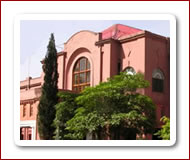| Department of Physiology |
 |
Dr. Umar Sohail Title:Alleviation of cyclic heat stress in broilers by dietary supplementation of mannan-oligosaccharides and lactobacillus-based probiotic Abstract:The present study was intended to investigate the effects of mannan-oligosaccharides (MOS) and probiotic mixture (PM) supplements on the several biological health markers of heat stress (HS) and gut histology and microbial ecology in broiler chicks. Two experiments were conducted, utilizing day old broilers. The birds were either subjected to HS (35 ± 2°C; HS group) or kept at thermoneutral temperature (TN group). Heat stressed birds were fed corn based basal diet supplemented with 0.05% MOS (HS-MOS group), 0.1% PM (HS-PM group), or their combination as a synbiotic (SYN; HS-SYN group). Birds of both HS and TN groups were fed corn based diet without any supplementation. In the first trial, broilers were vaccinated against Newcastle disease virus and infectious bursal disease virus, whereas, in second trial birds were kept non-vaccinated. Weekly feed consumption (FC), body weight (BW) gain and feed to gain ratio (FGR) were recorded. Broilers were killed on d 42 in experiment I, whereas, on d 21 and d 42 in experiment II. Blood serum, small intestine tissue, and cecal digesta were collected for analysis. Serum was analyzed for thyroid, and adrenal hormones, oxidative stress parameters, minerals and humoral immune response. Small intestine tissues were processed with hematoxylin and eosin stain to observe changes in villus height, width and crypt depth. Whereas, cecal and jejunal digesta were processed to enumerate pathogenic bacteria and to investigate molecular diversity of microbial population. Data regarding all parameters were subjected to ANOVA, whereas, Pearson’s ᵡ2 was applied to C-reactive protein data. Results of experiment I revealed that HS increased (P < 0.05) serum cortisol, cholesterol, total oxidants, and anti-oxidants concentrations in broilers compared to the TN broilers. Moreover, cecal Clostridium Perfringens count was higher (P < 0.05) in the HS group compared to TN group. Heat stress decreased (P < 0.05) body weight gain, feed consumption, triiodothyronine, and thyroxine hormones. Serum paraoxunase, arylesterase activities, and humoral immunity were lower (P < 0.05) in the HS group compared to the TN group. Dietary supplementations of SYN and PM improved (P < 0.05) growth performance, thyroxine concentrations. Whereas, supplementation of MOS improved (P < 0.05) copper, zinc and manganese concentrations compared to both HS and TN groups. Cortisol hormone, cholesterol, oxidants, and anti-oxidants concentrations were lower (P < 0.05) in all the supplemented groups, compared to the HS group. In experiment II, both on d 21 and d 42, HS lowered (P < 0.05) body weight gain, feed efficiency, villus height, width and surface area compared to the TN group. Heat stress altered cecal and tracheal microflora compared to the TN group. Moreover, serum corticosterone concentrations were higher (P < 0.05) in HS group compared to the TN group. Supplementation of MOS improved (P < 0.05) body weight gain and feed efficiency compared to the HS group. Supplementations of SYN, PM, and MOS lowered (P < 0.05) corticosterone concentrations compared to HS group. Crypt depth, villus width and surface area were higher (P < 0.05) in the HS-PM and HS-SYN groups compared to HS group.
|


